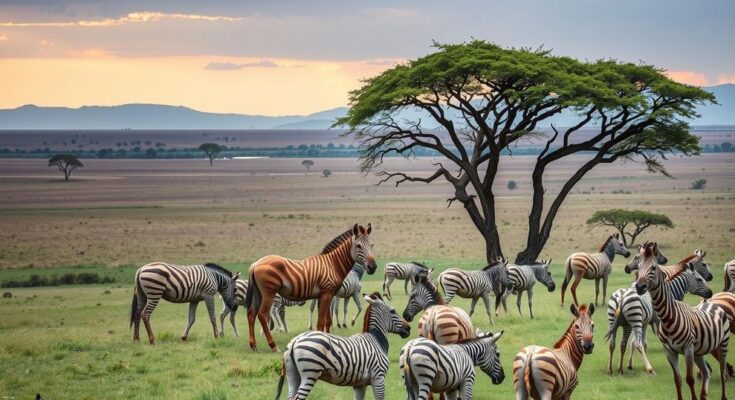Climate change is altering the migration patterns of wildebeest and other herbivores in Serengeti Park, affecting their traditional routes and grazing habits. The increased frequency of droughts and unexpected rainfall has decentralized their movements, threatening the ecosystem’s balance.
As the sun casts its golden rays upon the vast savanna of the Ikorongo Game Reserve, observers can spot herds of wildebeest grazing on recently nourished pastures. “Those are wildebeest!” remarked Julieth Jones, a knowledgeable guide, as she indicated the animals with her binoculars. Ecologist Gadiel Tanapa elaborated on their unusual presence in the area during the dry season, attributing it to altered rainfall patterns influenced by climate change.
Normally, wildebeest migrate northwards to the Maasai Mara during dry periods, seeking sustenance and water. However, recent climatic shifts, characterized by increased droughts and variable weather conditions, have disrupted this migration pattern significantly. This circular migratory behavior is crucial for multiple herbivore species, including zebras and Thomson’s gazelles, as they rely on seasonal rains and the availability of nutritious grasses in different regions of the Serengeti.
A recent study published in the journal PLOS Climate highlighted the enduring impacts of climate change in the Serengeti ecosystem, including a staggering temperature increase ranging from 4.8 to 5.8°C over six decades. Such dramatic changes threaten the delicate balance of the ecosystem, endangering not only the animals that inhabit these lands but also the intricate web of life reliant on this migratory cycle.
Scientists and conservationists emphasize the urgency of addressing climate change to safeguard the future of the Serengeti, as the complex interactions of weather, flora, and fauna are increasingly at risk.
The Serengeti National Park in Tanzania is renowned for its vast landscapes and rich biodiversity, particularly known for the spectacular migrations of wildebeest, zebras, and other herbivores. Migration in this region is influenced by seasonal rains, with animals moving in search of food and water according to the availability of resources. However, climate change poses a significant threat to these migration patterns, introducing erratic weather changes and temperature fluctuations that have been observed over the past several decades. The disruption of these natural migratory routes has profound implications for the entire ecosystem.
In conclusion, climate change and human activity are having a profound impact on the migratory patterns of wildlife in Serengeti National Park. The notable shift of wildebeest grazing where they typically would not during the dry season underscores the challenges ecosystems face due to changing climatic conditions. Immediate action is crucial to mitigate these impacts and ensure the preservation of these vital migration routes and the species that depend on them.
Original Source: www.lemonde.fr




